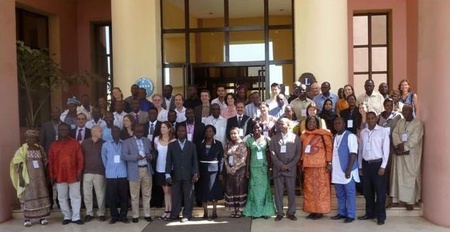On 17-19 November 2011, more than 70 participants from 11 African countries met in Bamako, Mali, to share lessons on how to design and implement fee exemption for maternal health.
The meeting was part of a ‘Community of Practice’, which was established this year with support from the FEMHealth project led by Dr Sophie Witter from Immpact, University of Aberdeen.
Countries represented at the meeting included: Mali, Burkina Faso, Benin, Morocco, Cote d’Ivoire, Ghana, Senegal, Sierra Leone, Kenya, Nigeria and Niger.
Across Africa, countries are putting in place fee exemptions for maternal health services in a laudable effort to reduce the continent’s high maternal mortality. The scope and content of the benefits package covered varies widely, however, with some countries covering caesarian sections only, while others aim to cover a more comprehensive set of maternal health services. Countries are at different stages of implementation, and practitioners on the frontline of these policies are confronting challenges.
The aim of the workshop was to bring together front-line practitioners, decision-makers, researchers, donors and civil society groups from 11 African countries to share lessons and create personal networks. The participatory workshop, which took place in English and French, was also an opportunity to bring together Anglophone and Francophone worlds, which rarely have the opportunity to meet and exchange.
A questionnaire sent out prior to the meeting found that the only common element in national policies adopted across the region to increase access to maternal and neonatal services is the provision of free (or highly subsidised) caesareans. Otherwise, the package of services which is covered varies. No country in the region provides assistance to women to reach first level facilities – something which raised concern about geographical access, especially for poorer women in more remote areas.
Representatives from the Ministries of Health and national health insurance bodies were present, and also frontline staff, such as obstetricians and midwives from a number of countries. Civil society organisations such as HELP and Amnesty International were also represented. In relation to development partners, UNFPA, UNICEF, USAID, the French Ministry of Foreign Affairs and the Global Health Workforce Alliance participated. FEMHealth researchers and others from related research projects also took part, and lively exchanges allowed different points of view to be expressed.
Outcomes of the meeting will include not only documentation of the experiences to date of national policies, but also closer ties between individuals working in different roles in the health systems across the region. A technical note will be available for countries to use as an advocacy tool to improve fee exemption policies for maternal health services. Participants also produced a set of priority actions they plan to implement when they return to their countries.
FEMHealth, which is funded by the EC, is a research partnership spanning eight partner institutions in the UK, Belgium, Burkina Faso, Benin, Mali and Morocco. Its objectives are
• to develop new methodological approaches for the evaluation of complex interventions in low-income countries;
• to improve the health of mothers and their newborns by performing comprehensive evaluations of the impact, cost and effectiveness of the removal of user fees for obstetric care on maternal and neonatal health outcomes and service quality; and
• to facilitate a broad exchange of evidence between policy-makers, researchers and other stakeholders.
The Community of Practice is based within the Harmonising Health for Africa initiative. It focuses on financial access to health services. Support was received from other organisations such as Health Systems 20:20 to enable delegates to attend the meeting.
The Community of Practice will continue to support the exchanges via its website (http://groups.google.com/group/CoP-Financial_Access_Health_Services?hl=en) and the newly launched blog (http://healthfinance.weebly.com/), as well as through future meetings.
For further information, please see: www.abdn.ac.uk/femhealth


